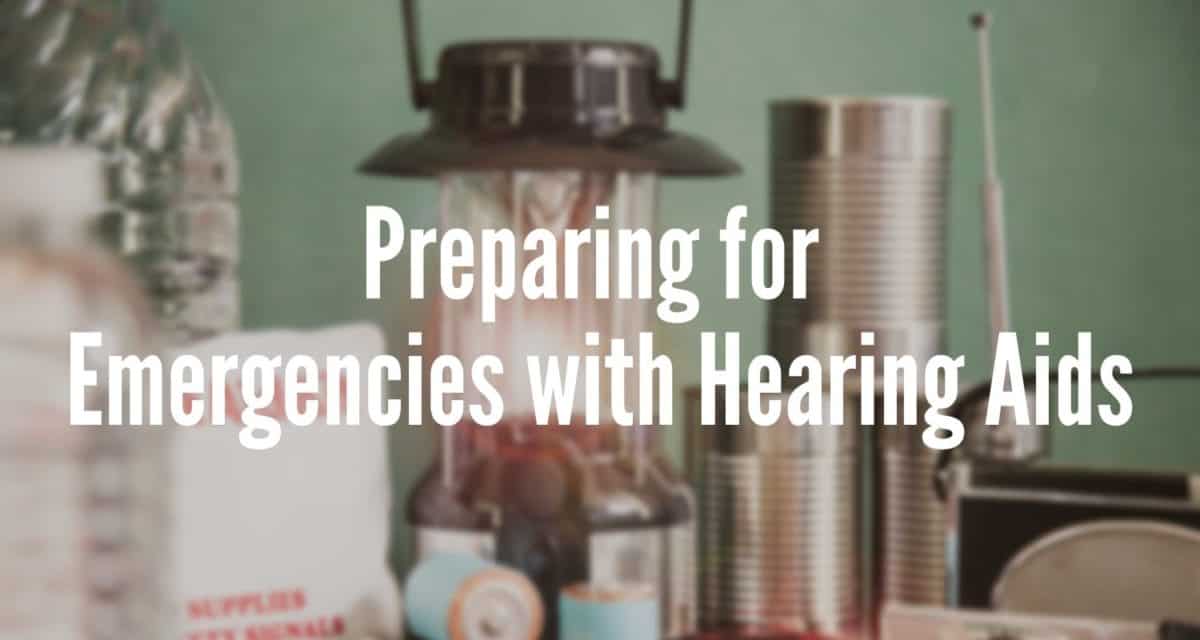- The Connection Between Hearing Loss and Dementia - July 30, 2024
- The Advantages of Rechargeable Hearing Aids - July 16, 2024
- How to Enjoy Music Festivals While Protecting Your Hearing - July 3, 2024
As our weather continues to increase in drama, we find ourselves now more than ever in a position to plan for emergencies. How do you plan for the unthinkable? With wildfires, hurricanes, earthquakes, floods, and tornadoes forcing millions more people to leave their homes unexpectedly, it makes sense to prepare for an event that could leave you without your routines and necessary tools integral to the use of your hearing aids.
Preparing for emergencies
Everyone, regardless of their status as a hearing aid wearer, should have a kit ready to assist in times of natural disasters and other emergencies. You can find guidance for general preparedness packs at Ready.gov. The basic contents should include:
- Drinking water
- Non-perishable food items
- Flashlight
- First aid kit
- Face masks, such as N95
- Basic tools
- Paper maps
- Cell phones with backup charge
Keep the kit well stocked and in a convenient place, like the entryway closet of your home or in your car. You can add to this list as your personal needs require. Hearing aid wearers should be observant of their specific needs so that their hearing is prioritized in a time of upheaval.
Add ons to basic kits for hearing aid wearers
Prepare a smaller carrying case solely for your hearing aid equipment
For anyone who has traveled with hearing aids, you probably have a smaller, dedicated case for your hearing aid care. Make a second bag available for your emergency kit and stock it with all the items you use daily like a soft cloth for cleaning and a dry storage box for your hearing aids.
Stock extra batteries
We can’t predict what the power situation will be in an emergency. Make sure you’re prepared for the worst by stocking your kit with extra batteries. To be suitably ready, include about a month’s worth of batteries in your kit so that you are armed for the long haul.
Include a backup system
If you are in the fortunate circumstance to purchase a backup hearing aid system, you should also include this in your preparedness kit. This might look like a second set of hearing aids (the gold standard). Whenever you upgrade your hearing aids, your old set (if still functioning) should go right into your kit. This is why keeping your old set of hearing aids is a prudent choice.
You might also invest in a personal sound amplification device, which will work well in a tight spot. They are a more inexpensive choice and can enhance all external sounds.
Pen and paper just in case
Add a notepad and a few pens into your kit. If all else fails, you will be able to communicate with others using the written form. It’s a scenario we hope to never encounter, and yet, preparing for it will help you feel most ready for the unpredictable.
Copies of medical documents and warranties
In circumstances in which your home might be in danger, you should have copies of medical documents you might need to access in an emergency, as well as the warranties for your hearing aids.
List of emergency contacts
Again, if power is going to be an issue, we can’t simply pop onto our smartphones to access the contact information of loved ones. We might be using landlines, folks. Keep a laminated copy of your friends and family and how to reach them, like phone numbers and addresses.
Enlist a buddy
If you live with a loved one or spouse, they can function as your emergency ‘buddy.’ Someone who knows your needs, strengths, and limitations, just as you know theirs. If you live alone, consider tapping a close friend or family member to be your buddy. It’s always better to go together through trying times.
How to know when to be ready
Perhaps the most unsettling aspect of any disaster is that we never know when it will strike. Our warning systems are getting smarter and more reliable all the time, so register for an alert system. You can have texts sent straight to your phone so that you will always be aware of incoming danger. In these emergencies, having an extra buffer of warning can make a big difference in how successful your experience will be.

